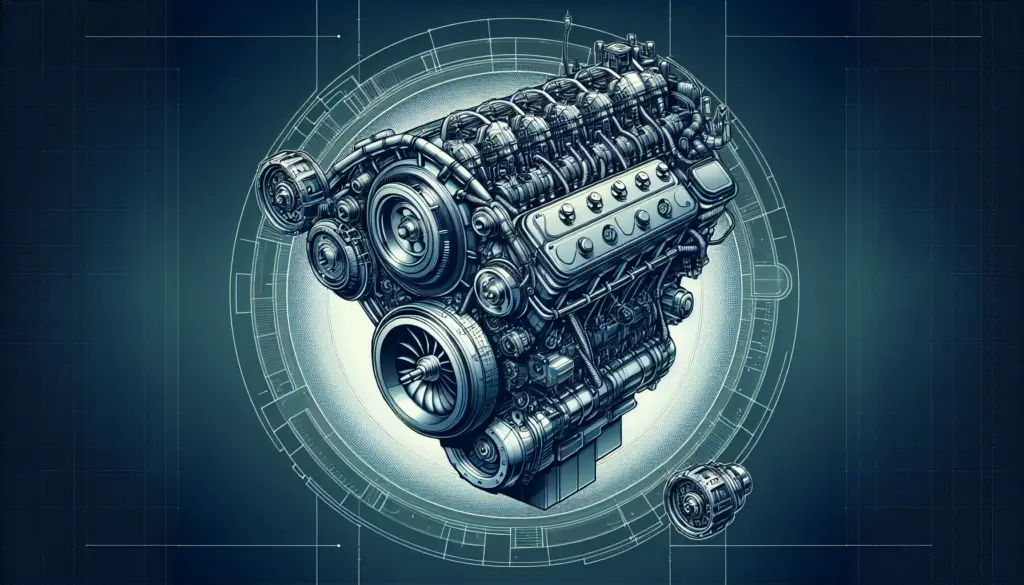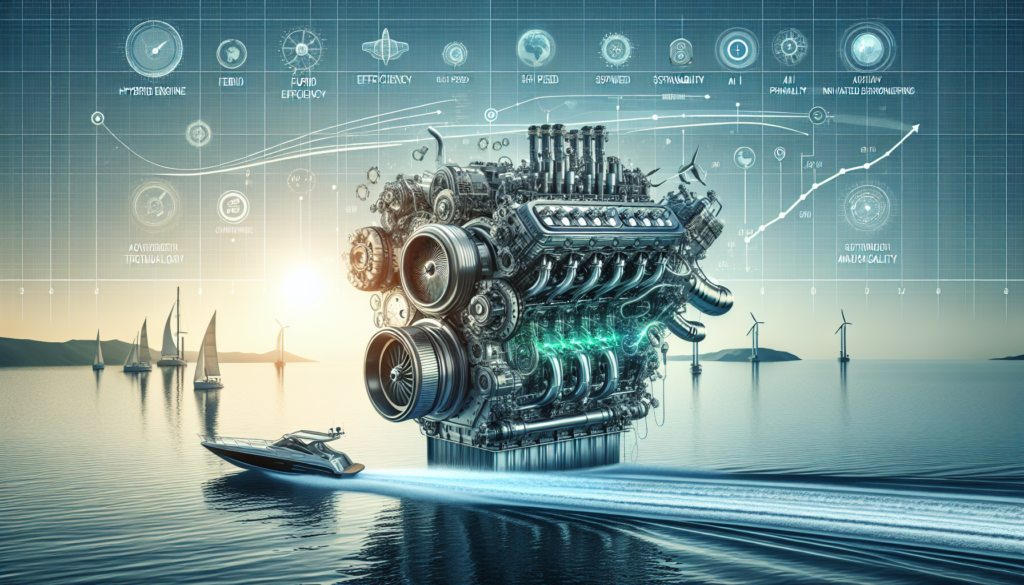Stepping into the fascinating realm of marine advancements, “The Top Boat Engine Technologies To Watch Out For In The Coming Year” offers you an insightful journey into the future of boating. This article brings to your attention the most noteworthy, cutting-edge engine solutions, trends, and innovations that promise to revolutionize the way you sail in the coming year. Get ready to discover how these technological advancements will improve your nautical experiences.

Increasing Popularity of Electric Boat Engines
In recent years, you might have noticed that electric boat engines are gaining a significant amount of popularity. If you’re new to this concept, let’s start from scratch.
Understanding the Basics of Electric Boat Engines
Electric boat engines, as the term implies, are powered by electricity which makes them a much greener and more sustainable choice compared to their traditional counterparts that run on fossil fuels. These engines are powered by batteries, usually lithium-ion, that are charged via any electric power source. The battery stores this charge and powers the boat’s motor for a certain duration, depending on the battery’s capacity.
Reasons for Increasing Popularity
There are several reasons why electric boat engines are having their moment in the sun. For starters, these are quiet and produce no exhaust, making your boating experience much cleaner and serene. Since these engines don’t require fuel, there’s a significant cut in operational costs. Additionally, these are quite simple in terms of mechanics, resulting in lesser maintenance demands. Lastly, as global warming continues to pose a grave concern, more and more people are seeking ways to reduce their carbon footprint – and choosing an electric boat engine is a step in the right direction.
Top Manufacturers to Consider
Numerous manufacturers are making leaps in this space, but some of the top names that you should consider if you’re planning to make the switch include Torqeedo, Pure Watercraft, ePropulsion, and Elco. These manufacturers are known for their high-quality products that combine top-notch technology with durability and reliability.
Hydrogen Fuel Cells for Boats
Shifting our focus to another innovative technology in this domain – let’s discuss hydrogen fuel cells.
How Hydrogen Fuel Cells Work
In simple terms, a hydrogen fuel cell works by converting chemical energy into electricity. It consists of an anode, cathode, and an electrolyte membrane. Hydrogen is passed through the anode, and oxygen through the cathode. A chemical reaction takes place, producing electricity, heat, and water (which is the only byproduct).
Benefits of Hydrogen Fuel over Traditional Fuel
First and foremost, hydrogen fuel cells produce zero harmful emissions, making them an environmentally friendly alternative to traditional fuels. Second, hydrogen is a more efficient fuel source, often providing a greater range than traditional fuels. Lastly, while the technology is still relatively new, it is rapidly improving with potential for significant cost reductions in the future.
Challenges in Implementing Hydrogen Fuel Cells
Unfortunately, the implementation of hydrogen fuel cells is easier said than done. Hydrogen is notoriously difficult to store and transport, presenting a significant challenge. Also, the initial costs associated with switching to hydrogen fuel cells are high, although these costs are expected to drop as the technology advances.

Inboard vs. Outboard Engines: Emerging Trends
Earlier, the dilemma for most boaters was to choose between an inboard and an outboard engine. However, with numerous technological advancements, the tale is no longer the same.
Understanding Inboard and Outboard Engines
Inboard motors are ones that are mounted inside the boat’s hull, whereas outboard motors are attached to the outside of the boat. Inboards are generally more powerful and offer better stability, but they’re also more complicated and expensive than outboards.
Recent Innovations in Inboard Engines
Inboard engine manufacturers are continually innovating to make their products more potent, efficient, and user-friendly. Some noteworthy advancements include fuel injection systems for better fuel economy and the incorporation of digital throttle controls for smooth operation.
Recent Innovations in Outboard Engines
Similar to inboard engines, outboard ones are also undergoing some groundbreaking changes. These innovations include lighter materials for better boat balance, advanced propeller designs for greater speed, and increased horsepower for enhanced performance.
Smart Boat Engine Technologies
In today’s digital age, smart technologies have permeated almost all aspects of our lives, and boat engines are no exception.
Use of IoT in Boat Engines
The Internet of Things (IoT) is leading the charge by connecting boat engines to the virtual world. This connectivity allows for real-time data monitoring and reporting, which can significantly improve overall engine efficiency and extend its lifespan.
Predictive Maintenance using AI
In addition to IoT, manufacturers are also integrating Artificial Intelligence (AI) to enable predictive maintenance. Essentially, AI can use collected engine data to predict potential faults before they occur, allowing for timely repairs and reducing the risk of significant breakdowns.
Consumer Demand for Smart Boat Engines
Today, consumers demand more than just basic functionalities. They’re yearning for smarter, more efficient, and easier to manage boat engines. Hence, manufacturers that incorporate smart technologies into their offerings are likely to have a competitive edge in the market.

Emission Control Technologies for Boat Engines
With increasing environmental concerns, the need for emission control in boat engines has never been more critical.
Understanding the Need for Emission Control
Emissions from boat engines, particularly those running on diesel, contribute significantly to air and water pollution. They also lead to climate change, tainting the world’s precious ecosystems.
Emission Control Techniques in Boat Engines
Several emission control techniques are being employed in boat engines these days. These include exhaust gas recirculation, selective catalytic reduction, and particulate filters, all of which aim to reduce the amount of harmful pollutants released into the environment.
Effectiveness and Challenges of Emission Control Technologies
While the results so far have been encouraging – what with cleaner air and water – there still remain some challenges. These mainly relate to the high costs involved and the potential for reduced engine performance. The goal, therefore, is to strike a balance between environmental responsibility and engine efficiency.
Hybrid Boat Engine Technologies
If you’re inclined towards both traditional and electric engines, hybrid boat engines might be just for you.
Basics of Hybrid Boat Engines
A hybrid boat engine combines an internal combustion engine and one or more electric motors. While the combustion engine is used for high-speed cruising, the electric motor comes in handy for low-speed maneuvering, providing a balance between power and efficiency.
Advantages of Hybrid Boat Engines
Hybrid boats can travel longer distances and at higher speeds compared to fully electric boats because they effectively utilize both forms of propulsion. They are also quieter, cleaner, and require less maintenance than conventional engines.
Top Models and Manufacturers of Hybrid Boat Engines
Manufacturers such as Greenline, Ferretti, and Sun Tracker are unveiling groundbreaking hybrid models, proving that high performance and being eco-friendly aren’t mutually exclusive.

Tech Innovations in Diesel Boat Engines
While we’re focusing on the greener alternatives, it’s essential not to omit some remarkable innovations in the traditional diesel engines.
Modernizing Traditional Diesel Engines
Traditional diesel engines are getting a makeover with advancements like common-rail fuel injection, turbocharging, and even hybridization, making them more efficient, quiet, and environmentally friendly than before.
Performance Improvements in Diesel Engines
These tech-driven upgrades lead to improved engine performance, better torque, lower noise and vibration levels, and enhanced fuel economy- a dream come true for any boater.
Changes in Consumer Demand for Diesel Engines
As a boat owner, you should know that the demand for diesel engines remains high despite the surge in electric and hybrid alternatives. This is largely attributable to their proven reliability, powerful performance, and high torque, especially for larger vessels.
Improvements in Boat Propulsion Systems
The realm of boat propulsion isn’t left untouched by the wind of technological advancements.
Trends in Propulsion Technology
Consternation about environmental sustainability and fuel efficiency is driving revolutionary changes in boat propulsion technology. Innovations like water jet propulsion, pod propulsion, and electric propulsion are gaining traction, aiming to provide a seamless blend of power, speed, and efficiency.
Impact on Fuel Efficiency and Performance
These advancements are not just about going green; they’re substantially uplifting the fuel efficiency and overall performance of boats. They’re providing boaters with the power they need while also ensuring that their impact on the environment is as minimal as possible.
Key Players in Boat Propulsion Technology
Manufacturers like Volvo Penta, Brunswick, and Yanmar are at the forefront of these propulsion advancements, exhibiting their commitment to transit maritime industry towards a greener, more sustainable future.
Robotics in Boat Engine Maintenance
In an age where robotics is highly prevalent, it’s only fitting to introduce it into boat engine maintenance.
Application of Robotics in Maintenance
Robotic applications in boat engine maintenance are rapidly increasing, from autonomous monitoring systems to self-operating robotic arms that can accurately perform maintenance tasks.
Benefits and Challenges of Using Robotics
The introduction of robotics certainly does make maintenance safer, more precise, and efficient. However, the upfront cost is high and the need for specialist knowledge and training poses a barrier for its widespread adoption.
Future Predictions for Robotics in Boat Engine Maintenance
Despite these challenges, the potential for robotics in boat engine maintenance is vast. Advancements on the horizon may soon address these issues, presenting a promising and dynamic future for this intersection of technology and marine craft.
Energy Recovering Technology in Boat Engines
A notable development in the world of boat engines is the advent of energy recovery systems, which round up our discussion on the top boat engine technologies.
Understanding Energy Recovery in Marine Engines
Energy recovery involves harnessing waste energy produced by the boat’s engine during operation and converting it into usable energy. This can then be used to power different onboard systems, thus enhancing overall system efficiency.
Benefits of Energy Recovery Systems
Energy recovery systems significantly contribute to improved fuel efficiency and reduced emissions. By harnessing waste energy, these systems help in decreasing the overall energy consumption of the boat.
Top Models Incorporating Energy Recovery Technology
Companies like Wärtsilä and MAN Energy Solutions are leading advancements with their innovative models that incorporate energy recovery technology, representing a significant step toward more sustainable and efficient marine operations.
In the end, only time will tell how these top boat engine technologies reshape the future of the marine industry. As a boater, your proactive efforts to flag on these changing winds will undoubtedly set you on a journey towards a greener, more sustainable, and highly enjoyable boating experience.

